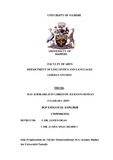Das Afrikabild In Christof Hamanns Roman
| dc.contributor.author | Kipkorir, Rop Emmanuel | |
| dc.date.accessioned | 2019-01-18T10:01:44Z | |
| dc.date.available | 2019-01-18T10:01:44Z | |
| dc.date.issued | 2018 | |
| dc.identifier.uri | http://hdl.handle.net/11295/105071 | |
| dc.description.abstract | Since the last decade of the 20th century, writing about Africa has increasingly gained popularity among German authors. This rise in interest to write about Africa comes long after Germany lost its colonies in the continent as a result of losing in the First World War in 1918. This project presents the results of a critical analysis of the contemporary Africa-Novel Usambara by the German author Christof Hamann. The project aimed at analyzing the image of Africa as well as the stereotypes associated with the continent in the novel. The almost forgotten colonial history of Germany in Africa and especially in East Africa as well as present day relations between Germany and its former colony prompted the undertaking of this research. The novel chosen for analysis was viewed as particularly suitable due to its intertextuality which the author achieved through the parodical rewriting of colonial travel reports by German explorers in the 19th century as well as the long period of history covered in the novels narration running between the years 1888 and 2006. The theoretical framework for this project was based on the Postcolonial Literature Theory as well as Discourse Analysis. Edward Said’s concept of Orientalism in postcolonial studies was used to describe the image of Africa in the novel while Gayatri Spivac’s reflections on subalterns was used to show how the German author represents Africans in his novel. Homi Bhaba’s concept of hybridity was employed to explore the ensuing cultural mixture and the emergence of a “third space” due to the contact between Europeans and Africans. The project used Michel Foucault’s Discourse analysis to analyze the circumstances under which the stereotypes in the novel occur and how power relations between Europe and Africa dictate how Africa is represented. The analysis of the novel clearly brought out aspects of neocolonialism in independent Tanzania where the German government is still involved in exploiting the country for capitalistic gains through sport-tourism. | en_US |
| dc.language.iso | de | en_US |
| dc.publisher | University of Nairobi | en_US |
| dc.rights | Attribution-NonCommercial-NoDerivs 3.0 United States | * |
| dc.rights.uri | http://creativecommons.org/licenses/by-nc-nd/3.0/us/ | * |
| dc.title | Das Afrikabild In Christof Hamanns Roman | en_US |
| dc.type | Thesis | en_US |



